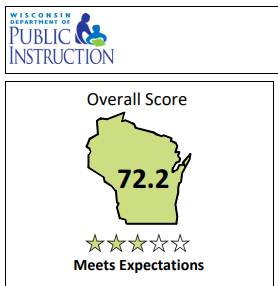Annual DPI Report Cards Impact District Decisions

January 9, 2020
The annual school and district report cards from the Wisc. Department of Public Instruction impact decision-making and provide a reflection of student achievement in N.J.S.D. and NHS.
The report card focuses on four main areas of student achievement and provides useful information to the district administrators, Susan Hull, district director of curriculum, instruction and assessment said.
By reviewing the data compiled by the DPI, school and district administrators gain a sense of both the strengths and shortcomings in the district, and can even compare scores with neighboring districts. The information aides in the decision-making process regarding curriculum, administration, and even staff salary schedules.
A recent example, Hull said, is the change in math curriculum in the elementary and middle schools, which teachers initiated several years ago and have since seen positive impacts.
In the past, N.J.S.D. reflected on the graduation rate as a major part of the NHS reported score and has implemented initiatives to decrease the dropout rate to below 6 percent. According to the report card, NHS currently meets that goal.
Hull stressed the importance of moving all students toward a proficient learning level. Within the current standards based grading system, that means students should reach green levels on state testing.
“We might not be at a green level with everyone, but as long as we can see that every year we are growing toward that, and growing enough, we will eventually be at green,” Hull said.
The district administrators and the N.J.S.D. Board of Education find much value in the feedback gained from the report. “[The report] really does give us some good information that we could gather, but it would be really labor intensive to do so,” Hull said.
The information also proves useful to families moving to the area; the score ensures a description of Neenah public schools’ achievement levels.
While the report card offers helpful, credible information regarding English and mathematics test scores, Hull said, the annual state testing overlooks science and social studies. To combat this gap in data, students engage in biennial testing on these subjects.
NHS consistently remains in the Meets Expectations category each year, and experienced an increase in 3.5 points overall in the last report card. Readers may access the full report here.

